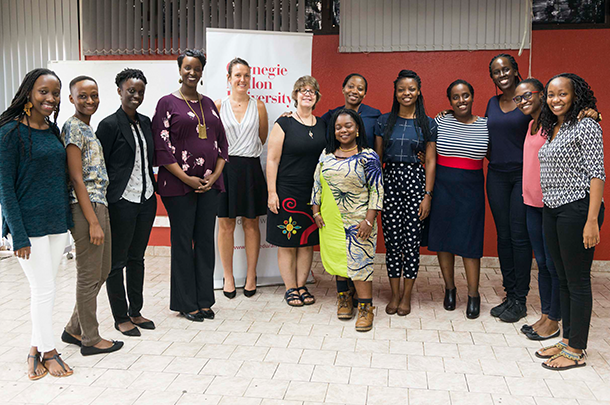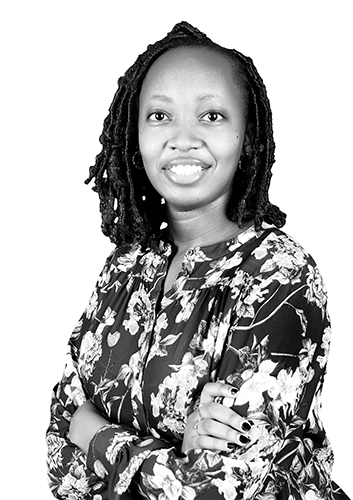Driven by curiosity
From an early age, CMU-Africa alumna Marie Ange Tesire wanted to seek out the new and discover the unexpected. That sense of curiosity has continued into her profession: machine learning engineer at Rwanda Space Agency.
From an early age, Marie Ange Tesire (MSIT ’20) wanted to seek out the new and discover the unexpected. As a child, you could find her dismantling broken radio receivers to understand how they worked or exploring a cracked lightbulb to see how the connection was wired. This sense of inquisitiveness has followed her throughout her life and has served as the foundation for many of her important decisions.
“One of the things that I can remember since I was little is a sense of curiosity. I always wanted to understand how things work,” says Tesire. “I was fascinated and wanted to know, if I change this part, if I put this here, what would be the output? Would it change or would it be the same?"

Source: CMU-Africa
Tesire with classmates and professors at CMU-Africa.
Her curiosity extended to many different fields, including physics, mathematics, and biology. She was drawn to understanding humanmade technology, but also remembers being interested in the mechanics of the body, like the pumping of our heart or the expansion of our lungs. When in ninth grade in Rwanda, she was asked to select three subjects where she would be interested in concentrating her studies. Math and physics were easy decisions for her, but she hesitated on what to include as her third area of interest. When she saw a fairly new area of study that she didn’t know very much about, computers, she said, “I could try that.”

Source: Marie Ange Tesire
During her time at CMU-Africa and in her career, Tesire is committed to using her knowledge and talents to make the world a more welcoming place for future female engineers.
Tesire’s interest in computing grew through high school, where she learned more about computer science and computer programming. When moving onto her undergraduate program, she decided to again explore a new technology area for her: networking. She earned her bachelor’s of science in network communication systems from the Adventist University of Central Africa (AUCA).
Continuing her education at Carnegie Mellon University Africa interested her because it presented new challenges and gave her the chance to explore areas of study that she had not yet been exposed to. She ultimately focused on data science at CMU-Africa, and has since used those skills to begin her career as a machine learning engineer at Rwanda Space Agency (RSA), an opportunity she found through her CMU-Africa network after virtually graduating from her master’s program in the thick of the COVID-19 pandemic.
At RSA, Tesire uses her expertise in data science and machine learning to advance the agency’s mission to use space technology to contribute to the improvement of the socioeconomic status of the country. RSA, established in 2020, is a newly-created venture aimed at developing Rwanda’s space sector.
During her time at CMU-Africa and in her career, Tesire is committed to using her knowledge and talents to make the world a more welcoming place for future female engineers.
“I have a responsibility to try and make it easier for the next generation to navigate the science and technology environment, because it's still not easy for girls to be in this field. I can speak from personal experience,” says Tesire, who has faced criticism around her skills because of her gender.
I have a responsibility to try and make it easier for the next generation to navigate the science and technology environment.
Marie Ange Tesire, Alumna (MSIT ’20), CMU-Africa
Tesire served as the vice president of CMU-Africa’s Women in Tech Club in 2019, where she helped reach out to female undergraduate students to teach them about the possibilities of a career in technology and engineering. As she continues her own career, she plans to set an example for those young girls by continuing to honor her sense of curiosity and always striving to learn new things.
